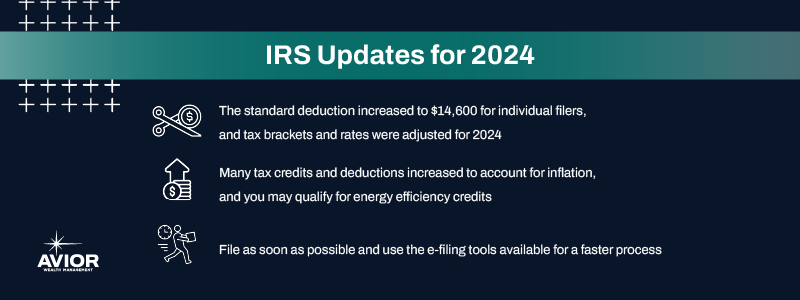IRS Updates for 2024
The IRS has made a few important updates to tax regulations for 2024. Find out what’s changed and how it may impact you

Filing and paying taxes already cause stress for many people. Keeping up with the latest regulatory changes can be even more daunting, as new tax laws and modifications are always being added that you must follow.
A recent survey found that 80% of taxpayers say they wish they understood taxes better, and 64% are stressed during tax season. But staying up to date on tax changes can help you optimize your tax strategy and minimize negative impacts on your investment portfolio.
If you’re unsure what’s changed in 2024, this guide demystifies the latest IRS updates and tax regulation changes with a clear guide to adjustments you need to be aware of when tax planning.
Foundational tax changes for 2024
Each year usually brings updates to foundational tax considerations like income brackets, rates, and standard deductions. Let’s walk through these key modifications for 2024:
Standard deduction
For individual filers, the standard deduction is now $14,600, which is up $750 from 2023. For joint filers, it increased $1,500 from 2023, now up to $29,200. The head-of-household standard deduction is $21,900 for 2024.
Tax brackets and rates
The new tax rates for each income bracket are as follows:
- 37% for income greater than $609,350 ($731,200 for joint filers)
- 35% for income greater than $243,725 ($487,450 for joint filers)
- 32% for income greater than $191,950 ($383,900 for joint filers)
- 24% for income greater than $100,525 ($201,050 for joint filers)
- 22% for income greater than $47,150 ($94,300 for joint filers)
- 12% for income greater than $11,600 ($23,200 for joint filers)
- 10% for income of $11,600 or less
Additionally, the basics that haven’t changed this year include the federal personal exemption, staying at zero, and there is still no limit on itemized deductions.
Modifications to tax credits and deductions
There are a few key changes to know related to credits and deductions this year. These changes reflect adjustments the IRS makes for inflation. Here are some common ones that should be on your radar:
- Earned income tax credit: This credit is $7,830 if you have three or more children who qualify this year.
- Foreign income exclusion: This is now $126,000, up from $120,000 in 2023.
- Alternative minimum tax exemption: This increased to $85,700 in 2024, and the phase-out amount is $609,350 for individual filers; those numbers increase to $133,300 and $1,218,700 for joint filers.
- Estate tax exclusion: For people who die in 2024, the basic exclusion is now $13,610,000, up from $12,920,000 in 2023.
- Gift exclusion: The annual gift exclusion was increased to $18,000 for 2024, up $1,000 from 2023.
In addition, pay attention to tax credits related to making your home more efficient with eco-friendly improvements and even buying an electric car. If you made qualifying home improvements in 2023, you could get a tax credit up to $1,200. Other updates, like installing water heaters or heat pumps, could mean an additional credit of up to $2,000.
Incorporating renewable energy could also mean you can claim 30% of the costs of those updates via the residential clean energy credit. The electric vehicle credit could equal $3,750 to $7,500 if you purchased a qualifying plug-in electric vehicle.
Deadlines and filing tips for 2024
As tax season approaches, stay aware of important filing deadlines and any new procedures introduced by the IRS. The 2024 tax deadline is on April 15, 2024. Mark your calendar and be proactive in gathering the necessary documents and information to ensure a timely and accurate filing. Don’t put off doing your taxes until the last minute to avoid unnecessary stress.
For estimated tax payments in 2024, here are the deadlines for filing:
- April 15, 2024
- June 17, 2024
- September 16, 2024
- January 15, 2025
Here are a few additional tips to help you prepare for a seamless 2024 tax season:
- File electronically
E-filing not only expedites the processing of returns but also reduces the likelihood of errors. It is now often the preferred method for those expecting a tax refund, as it typically results in faster processing and quicker receipt of any owed funds from the IRS.
- Organize your tax documents
Figure out all the paperwork you need for filing, including W-2s, 1099s, or other tax forms you received. You’ll also need your taxpayer or Social Security number and information about any major life change you went through.
- Be timely, but wait until you have all the forms
While businesses, banks, and employers have deadlines for sending tax forms, delays do happen. Make sure you have all the required tax documents before you begin. You don’t want to have to amend anything later. Once you have all the tax documents, file them as soon as possible.
- Research credit and deduction eligibility
You never want to overpay in taxes. When it’s time to file, make sure you know all of the credits and deductions you qualify for so you don’t leave money on the table.
- Work with a professional
These considerations get complicated quickly. A tax professional can review your financial situation, guide you through changes to laws and regulations, and ensure you take all available tax breaks as well as file everything according to IRS requirements.
The IRS states that it issues most refunds within 21 days, so the sooner you file, the sooner you can receive your refund, if applicable. File promptly so you avoid missing the deadline and any potential penalties.
Getting help for the 2024 tax season and beyond
Each year brings a new set of tax changes. Staying aware of what’s being adjusted and introduced will help you create a successful tax strategy that minimizes your tax liability and maximizes your savings.
The team at Avior is here to help you with tax planning throughout the year. Contact us today to speak with a financial advisor.
Disclaimer: Nothing contained herein should be construed as legal or tax advice. Avior and our Advisors will work with your attorney and/or tax professional to assist with your legal and tax strategies. Please consult your attorney or tax professional with specific legal and/or tax questions. Investment Management and Financial Planner are offered through Avior Wealth Management, LLC, an SEC-registered investment advisor. Past performance is not a guarantee of future results. Investments are subject to loss, including the loss of principal.
No Comments
Sorry, the comment form is closed at this time.




